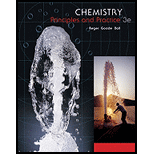
(a)
Interpretation:
The direction of the following endothermic reaction if more sulfur trioxide is added has to be determined.
Concept Introduction:
Le Chatelier’s principle states that if a system is in equilibrium state and it gets disturbed from the change of temperature or concentration of reactant and products then system response is to minimize that change. If reaction in equilibrium is disturbed then
(b)
Interpretation:
The direction of the following endothermic reaction if oxygen is removed has to be determined.
Concept Introduction:
Refer to part (a).
(c)
Interpretation:
The direction of the following endothermic reaction if the volume of the container is increased has to be determined.
Concept Introduction:
Refer to part (a).
(d)
Interpretation:
The direction of the following endothermic reaction if the temperature is increased has to be determined.
Concept Introduction:
Refer to part (a).
(e)
Interpretation:
The direction of the following endothermic reaction if argon is added to increase the total pressure is increased has to be determined.
Concept Introduction:
Refer to part (a).
Want to see the full answer?
Check out a sample textbook solution
Chapter 14 Solutions
Chemistry: Principles and Practice
- The equilibrium constant Kc for the synthesis of methanol, CH3OH. CO(g)+2H2(g)CH3OH(g) is 4.3 at 250C and 1.8 at 275C. Is this reaction endothermic or exothermic?arrow_forwardShow that the complete chemical equation, the total ionic equation, and the net ionic equation for the reaction represented by the equation KI(aq)+I2(aq)KI3(aq) give the same expression for the reaction quotient. KI3 is composed of the ions K+ and I3-.arrow_forwardFor the reactionH2(g)+I2(g)2HI(g), consider two possibilities: (a) you mix 0.5 mole of each reactant. allow the system to come to equilibrium, and then add another mole of H2 and allow the system to reach equilibrium again. or (b) you mix 1.5 moles of H2 and 0.5 mole of I2 and allow the system to reach equilibrium. Will the final equilibrium mixture be different for the two procedures? Explain.arrow_forward
- 12.103 Methanol, CH3OH, can be produced by the reaction of CO with H2, with the liberation of heat. All species in the reaction are gaseous. What effect will each of the following have on the equilibrium concentration of CO? (a) Pressure is increased, (b) volume of the reaction container is decreased, (c) heat is added, (d) the concentration of CO is increased, (e) some methanol is removed from the container, and (f) H2 is added.arrow_forwardWrite an equation for an equilibrium system that would lead to the following expressions (ac) for K. (a) K=(Pco)2 (PH2)5(PC2H6)(PH2O)2 (b) K=(PNH3)4 (PO2)5(PNO)4 (PH2O)6 (c) K=[ ClO3 ]2 [ Mn2+ ]2(Pcl2)[ MNO4 ]2 [ H+ ]4 ; liquid water is a productarrow_forwardConsider the system 4NH3(g)+3O2(g)2N2(g)+6H2O(l)H=1530.4kJ (a) How will the concentration of ammonia at equilibrium be affected by (1) removing O2(g)? (2) adding N2(g)? (3) adding water? (4) expanding the container? (5) increasing the temperature? (b) Which of the above factors will increase the value of K? Which will decrease it?arrow_forward
- During an experiment with the Haber process, a researcher put 1 mol N2 and 1 mol H2 into a reaction vessel to observe the equilibrium formation of ammonia, NH3. N2(g)+3H2(g)2NH3(g) When these reactants come to equilibrium, assume that x mol H2 react. How many moles of ammonia form?arrow_forwardAt a certain temperature, K=0.29 for the decomposition of two moles of iodine trichloride, ICl3(s), to chlorine and iodine gases. The partial pressure of chlorine gas at equilibrium is three times that of iodine gas. What are the partial pressures of iodine and chlorine at equilibrium?arrow_forwardAt room temperature, the equilibrium constant Kc for the reaction 2 NO(g) ⇌ N2(g) + O2(g) is 1.4 × 1030. Is this reaction product-favored or reactant-favored? Explain your answer. In the atmosphere at room temperature the concentration of N2 is 0.33 mol/L, and the concentration of O2 is about 25% of that value. Calculate the equilibrium concentration of NO in the atmosphere produced by the reaction of N2 and O2. How does this affect your answer to Question 11?arrow_forward
 Chemistry: Principles and PracticeChemistryISBN:9780534420123Author:Daniel L. Reger, Scott R. Goode, David W. Ball, Edward MercerPublisher:Cengage Learning
Chemistry: Principles and PracticeChemistryISBN:9780534420123Author:Daniel L. Reger, Scott R. Goode, David W. Ball, Edward MercerPublisher:Cengage Learning Chemistry for Engineering StudentsChemistryISBN:9781337398909Author:Lawrence S. Brown, Tom HolmePublisher:Cengage Learning
Chemistry for Engineering StudentsChemistryISBN:9781337398909Author:Lawrence S. Brown, Tom HolmePublisher:Cengage Learning Chemistry by OpenStax (2015-05-04)ChemistryISBN:9781938168390Author:Klaus Theopold, Richard H Langley, Paul Flowers, William R. Robinson, Mark BlaserPublisher:OpenStax
Chemistry by OpenStax (2015-05-04)ChemistryISBN:9781938168390Author:Klaus Theopold, Richard H Langley, Paul Flowers, William R. Robinson, Mark BlaserPublisher:OpenStax World of Chemistry, 3rd editionChemistryISBN:9781133109655Author:Steven S. Zumdahl, Susan L. Zumdahl, Donald J. DeCostePublisher:Brooks / Cole / Cengage Learning
World of Chemistry, 3rd editionChemistryISBN:9781133109655Author:Steven S. Zumdahl, Susan L. Zumdahl, Donald J. DeCostePublisher:Brooks / Cole / Cengage Learning
 Chemistry: An Atoms First ApproachChemistryISBN:9781305079243Author:Steven S. Zumdahl, Susan A. ZumdahlPublisher:Cengage Learning
Chemistry: An Atoms First ApproachChemistryISBN:9781305079243Author:Steven S. Zumdahl, Susan A. ZumdahlPublisher:Cengage Learning





